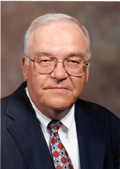In July, the University of Nebraska Board of Regents approved a resolution, supporting NU President L. Dennis Smith to search for inter-campus inefficiencies in the NU system.
 |
L. Dennis Smith |
Part of the resolution’s message was clear: to the maximum extent possible, efforts to reduce costs and improve the use of existing resources should be accomplished through “vertical,” program-eliminating cuts rather than across-the-board, “horizontal” cuts.
The chancellors from NU’s four campuses are meeting with academic and business leaders to make their proposed cuts to Dr. Smith, and those will be announced soon, he said.
“It is likely that we will have to cut faculty positions, including tenured faculty,” Dr. Smith said. “We will have to reduce the number of majors offered, the number of academic support programs available, and the scope of our educational outreach and statewide services.”
Cuts to the university are necessary because revenue to the state is lower than expected. Legislators will need to cut more than $700 million through fiscal year 2005. Tomorrow (Tuesday), they will begin work to trim money from the current fiscal year, which began July 1. Gov. Mike Johanns has proposed that legislators reduce $20 million from the university’s current-year budget. The combination of the governor’s proposal and previous allocation reductions of $16 million would eliminate any increases from the general fund that the university was to receive this year.
In their July resolutions, the regents asked Dr. Smith to look at the consolidation of programs and elimination of duplication of services in areas such as continuing studies, cooperative extension, student services, business and finance functions and academic programs.
John Adams, director of budgets and planning at UNMC, said that UNMC is unique among University of Nebraska campuses in that its programs aren’t duplicated. For instance, each of the NU undergraduate campuses in Omaha, Lincoln and Kearney offers degrees in fine arts, business and education. Cutting one of those programs would reduce student choices at a particular campus, but it wouldn’t eliminate an opportunity for a Nebraska student to get that degree at a state-assisted university. Conversely, elimination of a UNMC program would force in-state students to look out of state or at an in-state private university.
At UNMC, Chancellor Harold M. Maurer, M.D., will work closely with his Chancellor’s Council in determining a course of action.
Dr. Maurer said despite the financial turbulence, the Medical Center will stay its course toward becoming a world-class academic health sciences center.
“We will continue our strong efforts toward that goal,” Dr. Maurer said.